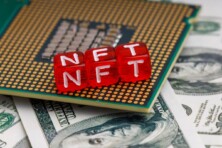These are the main terms you’ll come across while dealing with NFTs

A beginner’s guide to NFTs: 20 terms you need to know. Source: pexels.com
The NFT market is growing at an incredible pace. By the most modest estimates, total NFT trading amount reached $22 billion in 2021, while all the deals involving NFTs in 2020 brought their owners only $100m. Therefore, today even sceptics rush to jump on the bandwagon. However, investing in the luring NFT market means knowing at least the basics.
Burn an NFT – destroy the non-fungible token and eliminate it from the blockchain. Burned NFTs are sent to a verifiably inaccessible and un-spendable address. They get removed from circulation forever. The transaction is irreversible.
Dutch auction – a bidding technique that considers all bids for a given asset before arriving at a ceiling price, which gradually drops at specific time intervals. A gradual decline in price takes place every X minutes. Both the pace and percentage decrease are predetermined. The Dutch auction style is often used to redirect the excess gas fee from the miners towards the artists, or channelled to fund specific charities, or a community DAO.
Etherscan – a useful tool for exploring the Ethereum blockchain. You can search your wallet address to see your token balance or enter a transaction hash to verify transaction history. It’s an easy way to verify an NFT transaction’s completion, check for referrals, and royalty payments.
Fixed-price NFT – a fixed price sale is another common way to sell NFTs. Creators choose the price point during minting, and buyers don’t have to bid to make a purchase.
Floor price – the lowest price for collection items, rather than the average item price. It is updated in real-time.
Gas fee – transaction fee on the Ethereum blockchain platform. Each NFT sale requires some computing from the given network. Gas fees are payments made by users to compensate for the computing energy required to process and validate their transactions. The exact price of the gas is determined by supply and demand between the network’s miners and its users. When lots of people are using Ethereum, you can pay miners more to prioritise your transaction.
Gas limit – the maximum amount Ethereum users are willing to pay to have their transaction added to the blockchain. For the miners, a higher gas limit means that they must do more work to execute a transaction. If a gas limit is too low, the transaction will fail. Typically, 21,000 Gas will satisfy most transactions.
Minting NFTs – the process of turning a digital file into a crypto collectible or digital asset recorded on the blockchain.
NFT – non-fungible token, kind of a digital authenticity certificate, a piece of the software code stored via smart contracts that contains easily traceable and verifiable distinguishing information and certifies that the given digital asset is a one-of-a-kind.
NFT auction – creators set a starting price for the NFT and buyers must place bids at or above this price. After the first bid is placed on an artwork, the preset countdown starts. You’ll need to pay for gas each time you place a bid on the Ethereum-based marketplaces, as every action on the Ethereum blockchain is recorded and needs computing.
NFT bridging – transferring NFTs between different blockchain levels or moving them cross-blockchain. A non-fungible token is locked on one side of the bridge (network A) and the new token is minted on the other side of the bridge (network B) with the same Token ID and TokenURI. If the duplicate token is bridged back, it is burned on network B and the token with the corresponding Token ID is unlocked on the original network A.
NFT games – online games that are using smart contracts and blockchain ledgers to record every transaction and authenticate unique digital collectibles. NFTs allow developers to create and sell characters, avatars, and items that players can use to improve their gaming experience.
NFT marketplace – a blockchain-based platform for creating, trading, auctioning, and advertising NFTs.
NFT royalty – a percentage of the sale price that goes to the original creator after each re-sale of the NFT. NFT royalty payments are perpetual and are executed by smart contracts automatically. With most marketplaces, 5-10% is considered a standard royalty. However, the creator can determine a different amount at the time of minting the artwork.
No Reserve Auction – NFT auction without a minimum price set, prospective buyers themselves make a first bid which is a starting point for further bidding.
Play-to-earn (PTE) – NFT game type that enables people to earn real money from playing games and/or performing other services in the gaming environment using cryptocurrency.
Settle the NFT – submitting a transaction to the Ethereum blockchain to conclude the auction after winning the bid. By settling the NFT, you’re removing it from the marketplace’s escrow and transferring it to your wallet. The corresponding ETH funds are also sent from escrow directly to the artist.
Smart contracts – automated self-executing contracts where the terms of the buyer-seller agreement are directly written into lines of code. The code and the agreements it contains exist across a distributed, decentralised blockchain network. When predetermined conditions are met, the contract will automatically fulfil the required transaction.
Transaction hash – a unique ID recording each transaction on the blockchain. This includes NFT purchases, sales and even cancelling orders. All gas fees paid generate a transaction hash.
WETH (Wrapped ETH) – a currency that allows users to make pre-authorised bids that can be fulfilled at a later date without any further action from the bidder at OpenSea marketplace.
SEE ALSO:









